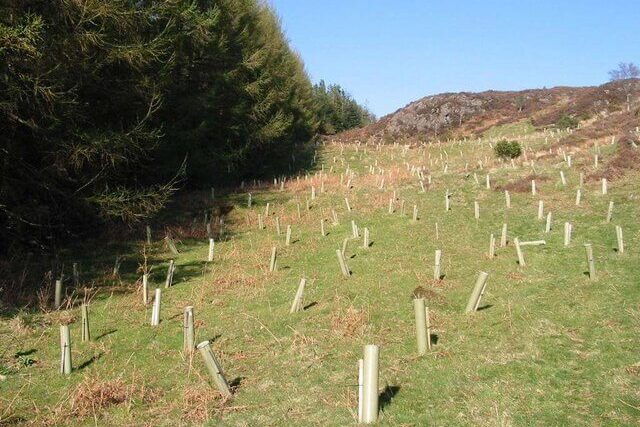
The UK government has fallen short of its annual tree-planting target in England, a shortfall that could jeopardise its net-zero ambitions, as highlighted by a recent report from cross-party MPs on the environmental audit committee (EAC).
To meet the requirements of the Environment Act, the Department for Environment, Food and Rural Affairs (Defra) set out nature targets, including the ambitious aim of planting 30,000 hectares of woodland in England by March 2025. The EAC’s report has cast doubts on the feasibility of achieving this objective, revealing a lack of sufficient government direction for the private sector, which accounts for three-quarters of the UK’s woodland.
The report underscores the critical importance of tree planting in achieving carbon and biodiversity targets and promoting sustainability within the construction industry. The EAC emphasises that UK-sourced timber is pivotal in satisfying the demand for low-carbon construction materials, thereby contributing to eco-friendly building practices.
The report also emphasises the necessity of significantly expanding woodland coverage, not only to address projected shortfalls in domestically produced softwood timber but also to align with the UK’s climate and environmental aspirations. Presently, tree-planting rates fall considerably short of the government’s target.
In light of these findings, the report offers recommendations for the government to prioritise tree planting in its forthcoming land use framework. This framework, originally meant to outline land allocation in the UK, has reportedly been delayed and possibly watered down. While government officials, such as Defra Minister Mark Spencer, have indicated that it will not dictate landowners’ actions in a restrictive manner, the report underscores the importance of an effective framework to guide tree planting efforts.
Furthermore, the report highlights the significance of selecting appropriate tree species to support biodiversity. It recommends native broadleaves as ideal for providing natural habitats, while conifers are vital for softwood timber. However, the report expresses concerns about striking this balance due to inadequate monitoring of the UK Forestry Standard and resource limitations within Forestry England.
The committee said it was “disappointed to observe that Forestry England is not currently on track to contribute fully to national tree-planting targets: to date it has only planted 303 hectares against its own target of 2,000 hectares between 2021-2026. Ministers should also commission work to identify opportunities for woodland creation on the wider government estate.”
The EAC chair, Philip Dunne, said: “The government’s target to plant 30,000 hectares of woodland in the UK by March 2025 is welcome, and by and large ministers appreciate the conflicting challenges and demands on woodland. But the committee is concerned that England is currently way off meeting its contribution to that UK-wide goal, and that the rate of planting must increase.”
The Conservative MP added: “At the moment there are simply too many overlapping strategies that aim to cover tree-planting policies in the UK and in England, and there is little evidence of an overall vision for the timber sector. The numerous strategies are disjointed: what is required is an overarching, holistic strategy that sets a long-term vision for how different types of woodland will be used to deliver government’s goals.”
A Defra spokesperson said: “Since the start of this parliament, we have planted or supported the planting of over 10.8m trees. Increasing tree cover is at the heart of our pledge to meet net zero ambitions, which is why we are investing £650m during this parliament in transforming England’s treescapes. We are also continuing to work on delivering our legal target to have 16.5% of England’s total land area covered by trees by 2050.
“Tree-planting rates are now at record levels, but we know there is much more to do and will continue to work with partners in both the private and public sector at pace to increase the nation’s tree cover and boost the forestry sector – supporting domestic timber production, creating new jobs and improving biodiversity across the country.”
——————————————————————————
At Natural World Fund, we are passionate about stopping the decline in our wildlife.
The decline in our wildlife is shocking and frightening. Without much more support, many of the animals we know and love will continue in their decline towards extinction.
When you help to restore a patch of degraded land through rewilding to forests, meadows, or wetlands, you have a massive impact on the biodiversity at a local level. You give animals a home and food that they otherwise would not have had, and it has a positive snowball effect on the food chain.
We are convinced that this is much better for the UK than growing lots of fast-growing coniferous trees, solely to remove carbon, that don’t actually help our animals to thrive.
This is why we stand for restoring nature in the UK through responsible rewilding. For us, it is the right thing to do. Let’s do what’s right for nature!
Donate today at https://naturalworldfund.com/ and join in the solution!

